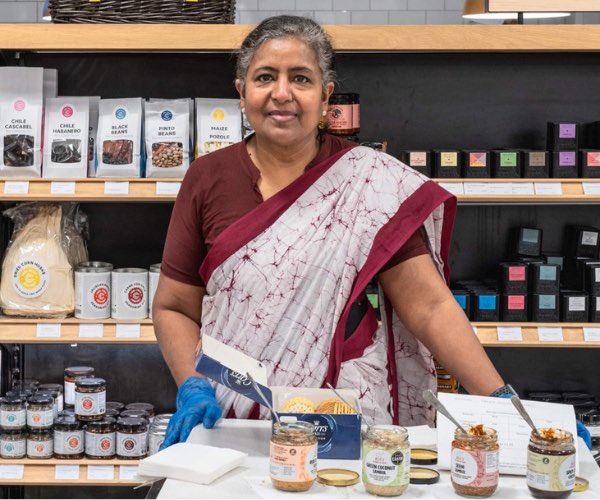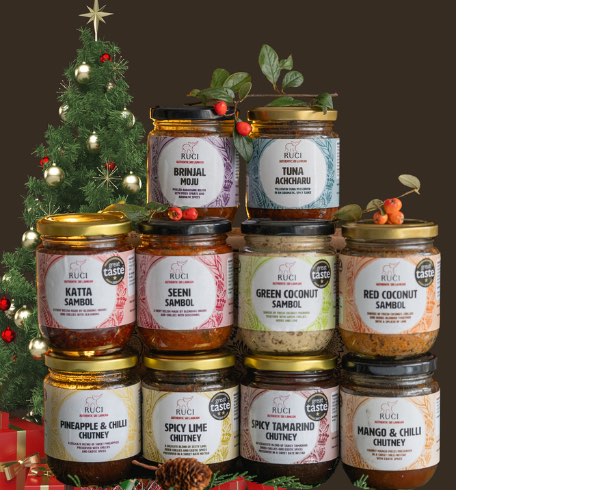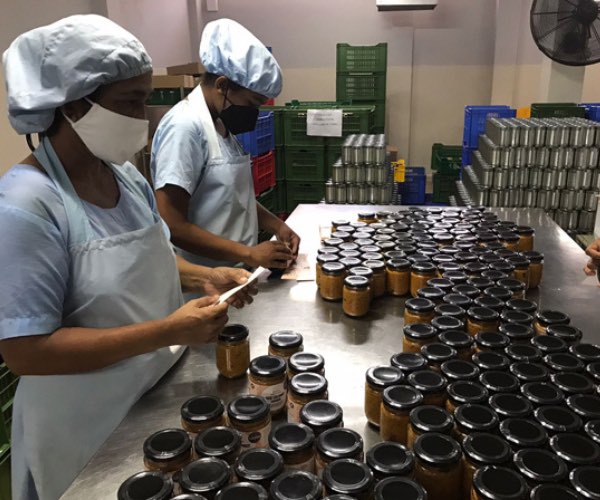
Dec 10 2023.
views 370In 2012 during a visit to Sri Lanka, Thana Sivasambu came across scenes where farmers in the Northern Province were destroying their crops as they could not obtain market rates for their produce. Thana was simply aghast at this situation especially considering how sacred food is in a country where many people were in need. It was then that she vowed to seek a way to stop this from happening. After much research, Thana realised that this is a challenge faced by the farming community across the island. She also discovered that farmers face losses as post-harvest waste due to a lack of storage and logistic facilities. Thanaa launched her brand Ruci Foods with a view of helping the farmers reduce their waste. She sourced ingredients directly from farmers at a fair price and all products are made and packaged in Sri Lanka. This not only helps to support the farmers by creating a steady demand for their produce but also helps generate sustainable job opportunities locally in Sri Lanka. Ruci Food comprises products where traditional recipes have been further developed to capture and elevate the natural flavours and goodness of spices and ingredients, without the addition of any artificial colours, flavours or preservatives. The products are handmade in small batches to preserve the goodness and flavours of the fresh ingredients bought from close to their source.
Thana had her education at St Lawrence’s School and St. Clare’s College in Colombo Sri Lanka and then completed the penultimate stage of CIMA (Chartered Institute of Management Accountants – U.K.) exams in Colombo as well. She moved to the UK in 1987 and completed her CIMA finals in the UK after which she started her professional career in Finance working for large companies like Hilton and BT.

Q What sort of products do you manufacture?
I wanted to introduce popular Sri Lankan staples to non-Sri Lankan food enthusiasts. I started with the most common range of sambols (Pol sambol, Seeni sambol and Katta sambol), different blends of curry pastes and chutneys (Mango, Lime, Tamarind and Pineapple). Hoppers, being a unique dish, had also drawn the interest of UK consumers at the time I was planning our launch, so I included hopper mix and hopper pan in our range.
Q How big is your enterprise?
We are a small business and a bootstrap start-up.
Having experienced the challenges of managing the training centre from the UK I did not want to invest in starting our own manufacturing plant. Especially with the health and safety aspect of food products, it wouldn’t be possible to manage it remotely from the UK. I have joint agreements to outsource our production. Collectively there are nearly 75 staff, mostly women, working in the factories who make our products.
Q The market for ethnic foods in the UK is very competitive. How did you manage to get noticed?
Indeed, it is extremely competitive and the expectation of the customers who are willing to try out new things is very high; and the first impression is what makes or breaks it, you don’t get a second chance! Our greatest advantage is the fine taste of Sri Lankan cuisine and making our products with locally sourced spices and ingredients. The country’s rich and fertile soil, coupled with its geographic location, contributes to the exquisite aromas and flavours that are unique to Sri Lankan spices. Our taste comes from our ingredients and the traditional cooking methods of layering spices at different stages of cooking to create a distinct taste!
Winning the Great Taste Award from the British Guild of Fine Foods gives our products the trust and credibility for customers to try them out.

Q What sets your products apart from the rest?
Q You are set to launch your product at Selfridges. How did that opportunity come about?
We launched at Selfridges, in October this year. The first Sri Lankan food brand to enter Selfridges (apart from tea). It’s a dream come true! It was where I wanted to take RUCI right from the start. I started having discussions with them 5 years ago, it has been a long journey. Sri Lanka offers the most exquisite products and needs to be placed where they are appreciated and valued for their taste and quality.
Q In your opinion what is it about Sri Lankan food that the British public likes?
The complexity of flavours, and the right balance of spiciness with flavours, come from the unique way of combining the ingredients. In Sri Lankan cuisine we use the dry and roasted spice mixes like the Indian cuisine; but combine them with fresh ingredients like coconut, curry leaves, rampe and lemon grass which are typically used in Thai and Indonesian cooking. Also, the strong Portuguese and British influences all add to creating the unique flavour profiles that Sri Lankan cuisine offers.

Q What other plans have you for the next year?
Food security is a global issue, and Sri Lanka is no exception. In line with our core model of creating value addition all along the supply chain, in 2024 our focus is going to be on supporting the supply chain to minimise post-harvest wastage and minimise losses to farmers.
We are working with universities and agriculture sector organisation on research and development initiatives. Next year we are investing in strengthening the brand’s digital presence. In addition, we will be scaling up our retail presence through selective speciality stores.
Q What words of wisdom would you share with other young entrepreneurs keen to start out in the food industry?
Something I would like to share with the artisan producers in Sri Lanka is that we should focus on quality and place our products in the premiere range. Sri Lanka cannot compete on price and volume with the larger players in the global market. Our advantage is our quality and unique ingredients and raw materials. We should focus on premiere niche markets competing on quality.
Pix courtesy - Ruci Food
0 Comments